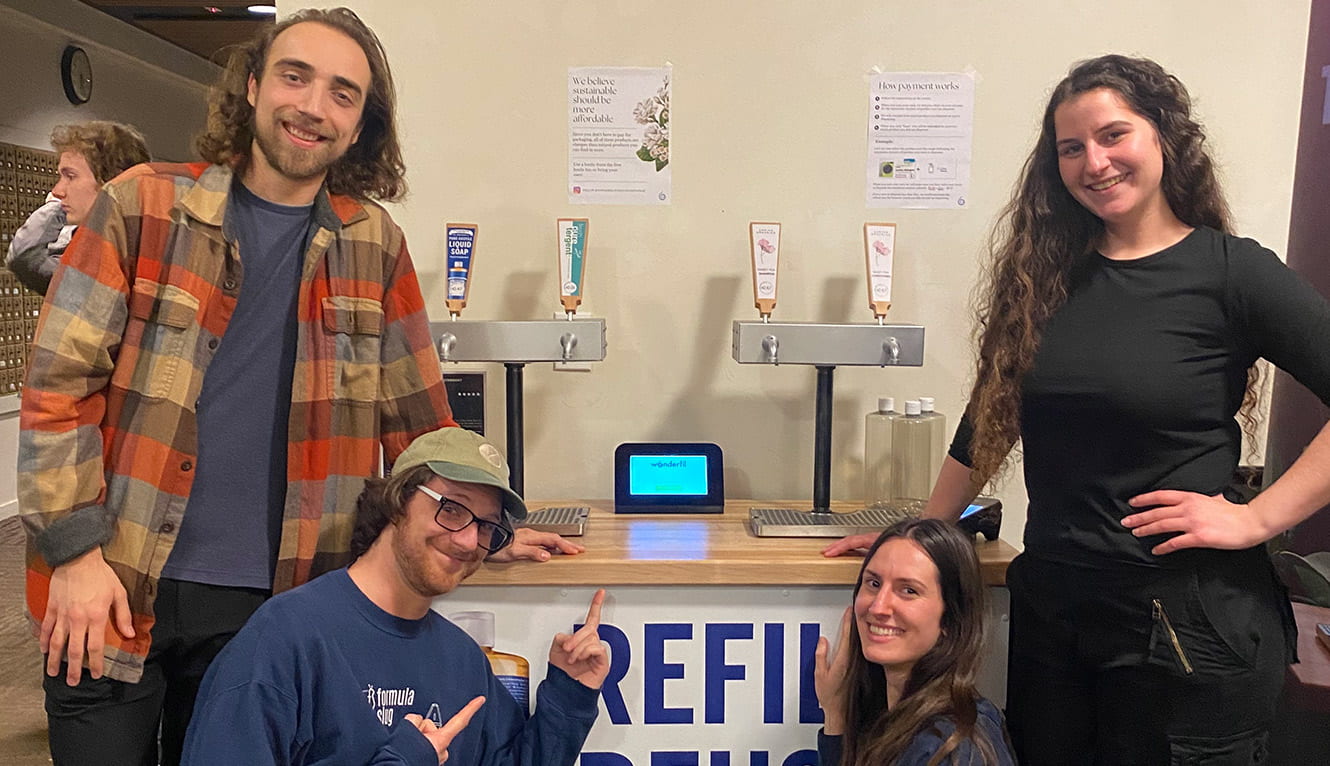It was at the height of the pandemic when then-UC Santa Cruz Baskin Engineering student Shiloh Sacks and her long-time friend Amelia Eichel decided to pursue an innovative, sustainable project.
Their project was Wonderfil—an affordable and convenient liquid and cream dispensing refill station with a mission to solve the single-use plastic problem by eliminating the demand.
With initial funding secured from two programs at UCSC and one at Eichel’s alma mater Lewis & Clark College, that idea soon transformed from a low-cost prototype that Sacks built in her Santa Cruz living room to a successful startup. Current Wonderfil stations allow customers to refill on household products, including shampoo, conditioner, and laundry detergent, at an affordable price. All that customers need to bring to a Wonderfil station is a reusable bottle.
“With Wonderfil, we’re not only reducing overall purchase cost for consumers by 20-40%, but we’re also driving sustainability and providing organic, locally sourced products,” said Sacks, who majored in electrical engineering.

Building blocks to becoming an entrepreneur
Sacks took a while to fully embrace an engineering identity. She wasn’t initially sure what she wanted to do as a freshman and felt out of place. But the programs she took part in during her undergraduate career helped set the pace for her success.
Sacks explained that if you want to thrive, then Baskin Engineering has plenty of opportunities to do so, with supportive faculty willing to help students explore different research and career interests and student clubs and organizations offering real-world, hands-on engineering experience.
She credits the extracurricular activities she was involved in—including being a member of the UCSC electric race car team called Formula Slug and various sustainability organizations on campus—her professors, and internships at Joby Aviation for providing her the necessary knowledge and training needed to pursue the Wonderfil idea.
“Baskin Engineering prepared me really well to be in a startup environment, where your success is a function of your output,” Sacks explained. “I found Baskin to be this amazing canvas where you can put all your energy out there and see what sticks. Sure, my program was really difficult, but it was through these challenging experiences I was set up to succeed.”
Transforming the sustainable product landscape
Wonderfil launched their first refill station at UCSC earlier this year, an exciting benchmark in their product timeline.
“It’s very exciting, but also very surreal. People say they love sustainability, but our thoughts were ‘Will they actually change their behavior in order to test out this product?’” Sacks said. “They did, and I think one of the most heartwarming things was seeing people truly embrace Wonderfil.”
UCSC currently hosts one Wonderfil station on campus, which is located just outside of the Porter College Dining Hall. Outside of UCSC, there are Wonderfil stations located at both UC Berkeley and Ethos, a low-waste living shop in Capitola.
Right now with the demand so high, Wonderfil will continue dispensing essential household products like shampoo, conditioner, and laundry detergent. Eventually, co-founders Eichel and Sacks plan to expand into other areas such as food products.
Sacks and Eichel were recently awarded a $40,000 Westly Prize, which funds young California entrepreneurs who are tackling social problems through technological innovation. The funding received will go toward their expansion plans. More information about future product locations and partnerships will be announced later this year.
Reflecting on the past three years of hard work and dedication to get Wonderfil to where it is today, Sacks noted the importance of not getting discouraged when things don’t immediately pan out as successful.
Her advice to students who may be struggling at this time is, “Take a break, if needed. But don’t give up. I am a strong believer that failure is part of the process of innovation. That’s the only way you truly learn and get better at something.”




